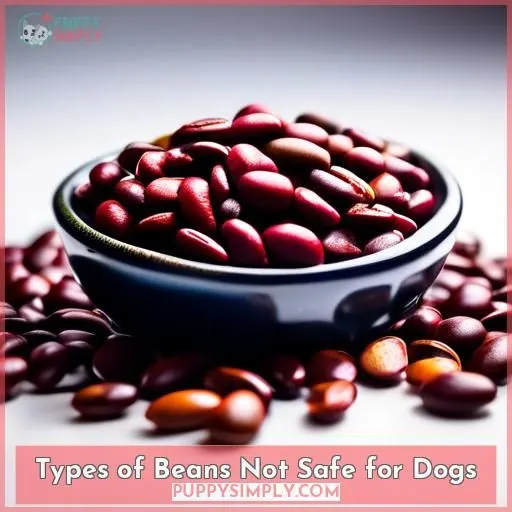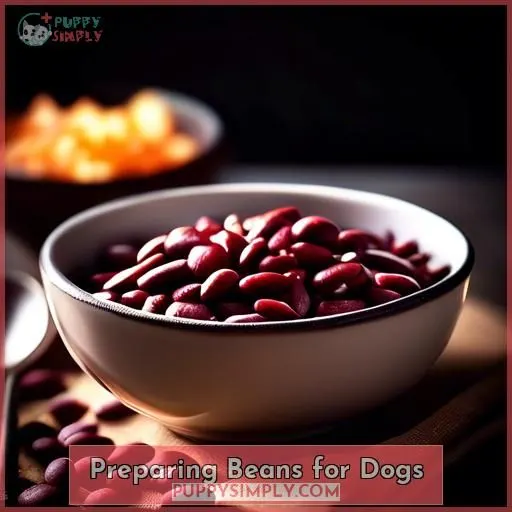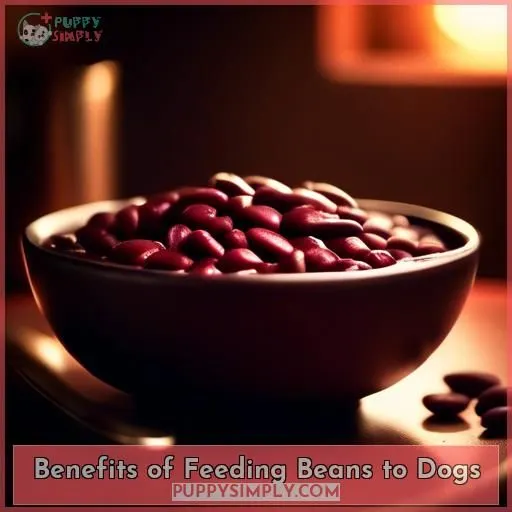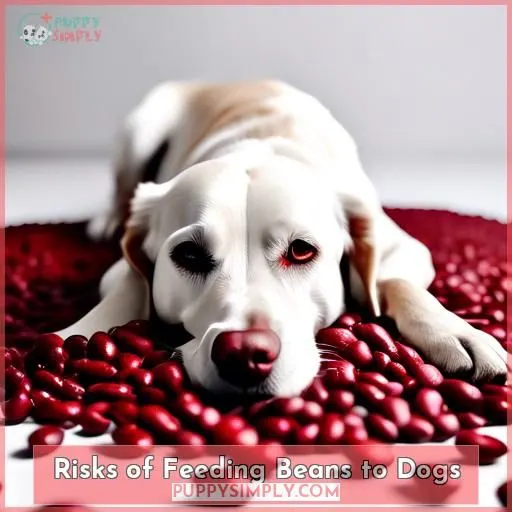This site is supported by our readers. We may earn a commission, at no cost to you, if you purchase through links.

Like other legumes, cooked red beans provide protein, fiber, and essential nutrients dogs need.
However, raw or improperly prepared beans can harm your canine friend.
This guide unveils the dos and don’ts of feeding red beans to dogs, ensuring your pup’s well-being while enjoying this nutritious treat.
Table Of Contents
- Key Takeaways
- Can Dogs Eat Red Beans ?
- Types of Beans Safe for Dogs
- Types of Beans Not Safe for Dogs
- Raw Kidney Beans (contain Toxic Phytohemagglutinin)
- Canned Kidney Beans (high in Sodium)
- Baked Beans (high in Sugar and Spices)
- Refried Beans (high in Fat and Seasonings)
- Adzuki Beans (cause Vomiting and Digestive Upsets)
- Chili Beans (contain Seasonings, Onions, Garlic, and Tomato Paste or Sauce)
- Coffee Beans (contain Caffeine Toxic to Dogs)
- Preparing Beans for Dogs
- Benefits of Feeding Beans to Dogs
- Risks of Feeding Beans to Dogs
- Frequently Asked Questions (FAQs)
- Conclusion
Key Takeaways
- Cooked red beans are safe for dogs in moderation and can provide protein, fiber, and essential nutrients.
- Raw or improperly prepared beans can harm dogs, so proper preparation is crucial.
- Black beans, lima beans, kidney beans, and green beans are safe for dogs when cooked and served without seasonings.
- Avoid feeding dogs raw kidney beans, canned kidney beans, baked beans, refried beans, chili beans, and coffee beans.
Can Dogs Eat Red Beans ?
Yes, dogs can eat red beans in moderation. They are a good source of protein and fiber, but they should be prepared properly to ensure they are safe for your dog. Red beans should be cooked and served without any added seasonings or ingredients that are unsafe for dogs, such as garlic, onions, or salt.
Types of Beans Safe for Dogs
There are many types of beans that are safe for dogs to eat, including black beans, lima beans, and green beans. These beans are a good source of protein and fiber, and they can be a healthy addition to your dog’s diet.
Black Beans
Black beans are safe for dogs in moderation and can be a beneficial addition to their diet.
They’re a good source of protein, fiber, and essential nutrients, such as iron, potassium, and folate.
However, it’s crucial to prepare black beans properly to ensure they’re safe for your canine companion to consume. Avoid adding seasonings, especially garlic or onion, as these can be harmful to dogs.
Cook black beans thoroughly and drain the water before serving them to your dog.
It’s always advisable to consult with your veterinarian before introducing new foods into your dog’s diet, especially if your dog has a sensitive stomach or known allergies.
Lima Beans
Lima beans are a nutritious addition to your dog’s diet, offering a range of benefits.
Protein-rich: Lima beans are a great source of plant-based protein, which is essential for rebuilding and maintaining muscles in dogs. They can be served alongside animal proteins found in commercial dog food to create a balanced and healthy meal.
Low in sugar: Lima beans have minimal natural sugar, making them a suitable and healthy snack for your dog. This is particularly beneficial for dogs with diabetes, as they can help maintain stable blood sugar levels.
High in fiber: Fiber is crucial for a dog’s digestive health. Lima beans are rich in dietary fiber, which can help regulate bowel movements, prevent constipation, and keep your dog feeling full.
Low in calories: Lima beans are a low-calorie food, making them an ideal choice for overweight dogs on a weight loss journey. They can help your dog maintain a healthy weight without overeating.
When introducing lima beans to your dog’s diet, it’s essential to be mindful of serving sizes. Start with small portions and monitor your dog for any adverse reactions, such as digestive issues or allergies.
Always consult with your veterinarian to determine the appropriate serving size for your dog’s specific needs.
Remember to cook lima beans thoroughly and avoid canned beans with preservatives and high sodium content. Additionally, avoid feeding your dog raw or seasoned lima beans, as these can cause digestive discomfort.
Kidney Beans (cooked)
Cooked kidney beans are safe for dogs in moderation and offer a range of health benefits. They’re a great source of protein, fiber, and essential vitamins and minerals, such as folate, iron, potassium, and magnesium.
However, raw kidney beans contain a toxin called lectin, which can be harmful to both dogs and humans. To ensure the safety of kidney beans for dogs, it’s essential to cook them thoroughly before feeding.
When introducing kidney beans to your dog’s diet, start with small servings and monitor their tolerance. Gradually increase the quantity over time while observing their digestion and overall well-being.
It’s also recommended to consult with your veterinarian before making significant changes to your dog’s diet.
To prepare kidney beans for your dog, soak them overnight, boil them for 45-60 minutes, and discard any damaged or discolored beans before serving.
Incorporating kidney beans into your dog’s diet can provide numerous benefits, including supporting muscle development, aiding in digestion, and contributing to overall well-being. However, it’s essential to remember that moderation is key, and kidney beans shouldn’t replace a balanced and complete meal specifically formulated for dogs.
Green Beans
Green beans are a tasty and nutritious snack for your pup.
They’re low in calories and high in fiber, making them a great choice for dogs looking to maintain a healthy weight.
Green beans also contain essential vitamins and minerals, such as vitamin A and potassium, which support overall health and well-being.
However, it’s crucial to prepare green beans properly to avoid digestive issues.
Avoid feeding raw or undercooked green beans, as they may contain harmful bacteria.
Also, be mindful of green bean allergies and serve them in moderation to prevent overconsumption.
Pinto Beans
Pinto beans are a nutritious and safe addition to your dog’s diet when cooked properly. These legumes are packed with protein, fiber, vitamins, and minerals that can benefit your dog’s health. However, there are some precautions to take when feeding pinto beans to your dog.
Here are some key points to consider when introducing pinto beans to your dog’s diet:
- Cooking: Ensure the beans are cooked thoroughly, as raw pinto beans can be difficult for dogs to digest. Soak them overnight, rinse, and then cook in fresh water until tender.
- Portion control: Introduce pinto beans gradually, starting with small amounts to monitor your dog’s response. Gradually increase the quantity over time.
- Avoid canned beans: Opt for fresh or dried pinto beans, as canned beans may contain preservatives and excess sodium that can be harmful to your dog’s health.
- Monitor for digestive issues: Keep an eye on your dog for any signs of digestive upset, such as gas, bloating, or constipation.
- Consult your veterinarian: Before making significant changes to your dog’s diet, consult with your veterinarian to ensure that the nutritional needs of your dog are met.
Pinto beans can be a healthy and tasty treat for your dog when prepared correctly. They can provide essential nutrients and contribute to your dog’s overall well-being.
Lentils
Just like pinto beans, lentils are a powerhouse for your pup, packed with calcium, iron, and magnesium. They’re a fiber-rich alternative to baked and refried beans, which can be heavy on a dog’s stomach.
Unlike garbanzo or chili beans, lentils are gentle and won’t cause a ruckus in your furry friend’s digestive system.
| Nutrient | Benefit for Dogs |
|---|---|
| Calcium | Strengthens bones |
| Iron | Supports blood health |
| Magnesium | Aids muscle function |
| Fiber | Promotes digestion |
Soybeans (including Edamame)
Just like lentils, soybeans, including those snackable edamame treats, can be a great addition to your pup’s diet.
They’re a solid protein source and a fiber supplement that supports digestive health.
However, watch out for soy allergies.
Keep it simple and safe!
White Beans
White beans, like other legumes, are generally safe for dogs in moderation.
They’re rich in protein, fiber, and essential vitamins and minerals.
However, some dogs may develop allergies to white beans.
It’s crucial to introduce them gradually and monitor your pup for any adverse reactions.
White beans can be used as a substitute in various recipes, including soups, stews, and salads.
Avoid high-sodium canned beans and seasoned preparations to prevent stomach upset.
Navy Beans
Navy beans are safe for dogs in moderation. They contain proteins which can help repairing muscles and other body tissues, and they’re also rich in potassium, which is essential for heart and kidney health.
However, it’s important to note that navy beans shouldn’t form more than 10% of your dog’s diet in a day, and the serving size should be adjusted based on your dog’s age, previous bean consumption, and dietary balance.
For example, an extra-small dog (2-20 lbs.) should have 1-2 small pieces of navy beans, while a large dog (51-90 lbs.
Before feeding navy beans to your dog, it’s crucial to follow some precautions. Soak the beans in clean water overnight and then cook them the next day to remove any toxins. Raw navy beans contain hydrocyanic acid, which is poisonous, so cooking them thoroughly will destroy the toxin.
Also, avoid serving navy beans with any salt or other spices, as dogs’ stomachs aren’t made for spicy or salty foods.
Navy beans can be a great addition to your dog’s diet, providing nutritional benefits such as protein, fiber, and essential vitamins and minerals. However, it’s essential to introduce them gradually and in moderation to avoid digestive issues like gas and bloating.
As with any new food, monitor your dog for any signs of allergic reactions or indigestion.
In conclusion, navy beans can be a healthy treat for dogs in moderation, but it’s essential to follow the recommended serving sizes and precautions to ensure your dog’s safety and well-being.
Types of Beans Not Safe for Dogs
You should steer clear of giving your dog red beans as they can cause vomiting and digestive discomfort. Other beans to avoid include raw kidney beans, canned kidney beans, baked beans, refried beans, chili beans, and coffee beans.
Raw Kidney Beans (contain Toxic Phytohemagglutinin)
As a responsible pet owner, safety should always be your top priority.
When it comes to feeding your dog, raw kidney beans are a big no-no. These beans contain toxic phytohemagglutinin, a substance that can cause kidney bean poisoning, leading to digestive upset and potential health issues for your furry friend.
Always ensure to cook kidney beans thoroughly before feeding them to your pet, or opt for safer alternatives like cooked kidney beans in small portions.
Canned Kidney Beans (high in Sodium)
Canned kidney beans are a convenient source of protein and fiber for your pup, but they come with a high sodium content. Be mindful of your dog’s bean sensitivity and adjust their sodium intake accordingly.
These beans can be a low-fat content fiber source and protein source, but it’s essential to monitor their consumption to prevent digestive issues.
Baked Beans (high in Sugar and Spices)
Baked beans, like canned kidney beans, are high in sugar and spice content. These ingredients can cause bloat risk, kidney damage, and pancreatitis in dogs. It’s essential to avoid feeding your dog baked beans as they can lead to digestive issues and health complications.
Always consult with a veterinarian before introducing any new food into your dog’s diet.
Refried Beans (high in Fat and Seasonings)
Refried beans are not safe for dogs to eat.
While they may be mashed into a paste, they often contain various spices that are not beneficial for your dog’s health. These spices can include garlic, canola oil, chili powder, and cumin, which are toxic to dogs.
Even the sodium in refried beans is unhealthy for dogs as they do not require much sodium in their diet.
Overconsumption of refried beans can cause digestive issues and excessive flatulence, which can be particularly problematic for dogs with sensitive stomachs.
It is always advisable to serve beans in moderation and avoid seasoning them or adding vegetables that you are not sure are safe for your pup.
If you want to add beans to your dog’s diet, consider safer options like pinto beans, kidney beans, black beans, garbanzo beans, soybeans, green beans, lentils, lima beans, or butter beans.
Always consult with a veterinarian before introducing new foods to your dog’s diet to ensure their safety and well-being.
Adzuki Beans (cause Vomiting and Digestive Upsets)
Just when you thought you’d cracked the code on dog-friendly beans, adzuki beans throw a wrench in the works. They’re a bit of a wild card, causing vomiting and digestive upsets in some pups.
- Beware of adzuki bean toxicity
- Watch for signs of adzuki bean allergies
- Understand adzuki bean intolerance
- Explore adzuki bean substitutes and take necessary precautions
Chili Beans (contain Seasonings, Onions, Garlic, and Tomato Paste or Sauce)
Chili beans are a beloved dish, but they can pose risks to your dog’s health. These beans contain seasonings like onions and garlic, which are toxic to dogs. Tomato paste or sauce can also cause digestive upset. To ensure your dog’s safety, avoid feeding chili beans and opt for plain, cooked beans without any added ingredients.
Coffee Beans (contain Caffeine Toxic to Dogs)
Coffee beans aren’t safe for dogs due to their caffeine content.
Caffeine toxicity can lead to restlessness, increased urination, muscle twitching, and even seizures in dogs.
If your dog ingests coffee beans, it’s crucial to consult a veterinarian.
Opt for coffee alternatives like decaffeinated coffee or herbal teas when making homemade treats for your dog.
Do not serve coffee beans to dogs as small portions can still lead to the risk of caffeine toxicity.
Preparing Beans for Dogs
When preparing beans for your dog, soak dried beans overnight to remove lectins and cook them thoroughly without seasonings or added ingredients. Avoid canned beans with preservatives and high sodium content, as these can be harmful to your pup.
Soak Dried Beans Overnight to Remove Lectins
To ensure your dog safely enjoys beans, soak dry beans overnight to remove lectins. This simple step helps break down complex proteins, making beans easier to digest.
Cook Thoroughly Without Seasonings or Added Ingredients
Cooking beans for your dog is crucial to ensure their digestive health. Here are three steps to follow:
- Soak Dried Beans Overnight: This helps remove lectins, which can cause digestive issues.
- Cook Thoroughly Without Seasonings: An unsalted preparation is best to avoid any added ingredients that could upset your dog’s stomach.
- Serve in Moderation: Be mindful of serving size to prevent digestive issues like gas or bloating.
Avoid Canned Beans With Preservatives and High Sodium Content
Avoiding Canned Beans with Preservatives and High Sodium Content
When it comes to feeding beans to your pup, it’s crucial to be mindful of the type of beans you choose. Canned beans, while convenient, often contain high levels of sodium and preservatives that can be detrimental to your dog’s health.
| Canned Beans | Risks | Alternatives |
|---|---|---|
| High in Sodium | Can lead to dehydration and other health issues in dogs | Soak dried beans overnight and cook them yourself |
| Preservatives | Can cause digestive issues and other health problems | Opt for fresh or frozen beans without added preservatives |
| High Sodium Content | Can be dangerous for dogs with certain health conditions | Drain and rinse canned beans to reduce sodium content |
It’s essential to remember that not all canned beans are created equal. Some manufacturers use more preservatives and higher sodium levels than others. To ensure your dog’s health, it’s best to avoid canned beans altogether and opt for fresh or dried beans that you can prepare yourself.
This way, you can control the ingredients and ensure your pup is getting the most nutritious and beneficial beans possible.
Limit Intake to Prevent Digestive Issues (gas, Bloating, Constipation)
To prevent digestive issues in your dog, limit their intake of beans.
Start with small servings and gradually increase the amount.
Keep an eye on their dietary changes and monitor for signs of gas, bloating, or constipation.
Additionally, raw kidney beans contain toxic phytohemagglutinin.
By following these guidelines, you can ensure your dog’s health and well-being while enjoying the benefits of beans.
Benefits of Feeding Beans to Dogs
Beans offer a nutritious boost to your dog’s diet, providing essential protein and fiber. They’re also packed with vitamins and minerals that support your pup’s overall health.
Rich in Protein and Fiber
As a dog owner, you want to provide the best nutrition for your furry friend.
Beans are a great source of protein and fiber, which are essential for your dog’s health.
Protein helps build and repair tissues.
Fiber aids in digestion and prevents constipation.
Beans also contribute to weight management, as they’re low in fat.
However, it’s crucial to prepare beans properly and feed them in moderation to avoid digestive issues like gas and bloating.
Provide Essential Vitamins and Minerals
Beans are a fantastic source of nutrition for dogs.
They provide essential vitamins and minerals that are vital for their health.
These nutrients include folate, which supports blood sugar regulation and blood cell production.
They also contain vitamins A, C, and K, and minerals like magnesium, manganese, and potassium.
By incorporating beans into your dog’s diet, you’re not only meeting their nutritional needs but also enhancing their overall well-being.
Aid in Digestion and Prevent Constipation
Yes, dogs can eat beans, and they can offer numerous benefits for their health. Beans are rich in dietary fiber, which aids in digestion and helps prevent constipation. They also provide essential vitamins and minerals that support a dog’s overall well-being.
However, it’s crucial to feed beans in moderation and ensure they’re properly cooked and unseasoned to avoid any potential risks.
Here are three ways to safely incorporate beans into your dog’s meals:
As a Snack-Filled Toy: Mash plain, cooked beans and freeze them for a couple of hours. Once semi-frozen, stuff the mashed beans into a Kong toy or a similar toy and give it to your dog as a treat. This method not only provides your dog with the nutritional benefits of beans but also serves as a mentally stimulating and enjoyable activity.
Incorporate Into Their Dog Food: Create a homemade mashed dog food by combining mashed plain beans with minced meat, such as chicken or beef, and mix in your dog’s favorite dry kibble. This homemade meal offers a balanced and nutritious meal option, providing your pup with protein, fiber, and essential vitamins and minerals.
‘Gravy’ for Kibble: Prepare a bean-based gravy to pour over your dog’s favorite high-quality kibble. Simply puree plain, cooked beans and mix with some chicken or beef stock to create a tasty gravy. This not only enhances the taste of your dog’s meal but also provides additional nutrients from the beans. Be sure to use a low-sodium stock, as excessive salt can be harmful to dogs.
Low-fat Content for Weight Management
When it comes to low-fat content for weight management, beans are a fantastic choice for your pup.
They’re packed with protein and fiber, which can help your dog maintain a healthy weight.
Additionally, beans are low in fat, making them an excellent option for dogs who need to shed a few pounds.
So, if you’re looking for a way to keep your dog’s weight in check, consider incorporating beans into their diet.
Risks of Feeding Beans to Dogs
Feeding your dog excessive amounts of beans can lead to digestive problems like gas and bloating. If you choose to give your dog canned beans, opt for low-sodium varieties to prevent health issues.
Overconsumption Can Cause Digestive Issues (gas, Bloating, Constipation)
Overconsumption of beans can lead to digestive issues in dogs, such as gas, bloating, and constipation. While beans are rich in protein, fiber, vitamins, and minerals, they should be introduced gradually to your dog’s diet.
Monitor your dog for any signs of discomfort and consult a veterinarian if concerns arise.
High-sodium Canned Beans Can Cause Health Problems
High-sodium canned beans can cause health problems for dogs. These issues include digestive problems like gas, bloating, and constipation. To ensure your pup’s safety, it’s advisable to avoid feeding them canned beans with high sodium content.
Opt for fresh or cooked beans instead, and remember to monitor their intake to prevent digestive discomfort.
Raw Kidney Beans Contain Toxic Phytohemagglutinin
Raw kidney beans contain toxic phytohemagglutinin, which can cause heart disease in dogs. It’s crucial to avoid feeding your pup raw kidney beans. If you’re considering introducing cooked kidney beans to your dog’s diet, consult a veterinarian for appropriate serving sizes.
Avoid Feeding Beans as a Substitute for Meat in Your Dog’s Diet
Avoid feeding beans as a substitute for meat in your dog’s diet.
While beans are rich in fiber, moderation is key.
Meat is a crucial component of a balanced diet for dogs, providing essential nutrients and energy.
Beans can be a great addition, but they should not replace meat entirely.
A balanced diet with both meat and beans is designed to enhance your dog’s overall health and well-being.
Frequently Asked Questions (FAQs)
Can dogs eat raw kidney beans?
No, you shouldn’t let your dog eat raw kidney beans. They contain toxins that can cause nausea, vomiting, and even poisoning. Always cook kidney beans thoroughly before feeding them to your furry friend. A few cooked ones are fine as an occasional treat.
How much of kidney beans can dogs eat in a day?
Let’s say your pup Buddy gobbled some kidney beans – no more than 1/4 cup per 20 lbs body weight daily is advised. Too many can cause gas or constipation, so moderation’s key for their digestive health.
Are green beans safe for dogs?
You’re in luck! Green beans are perfectly safe for dogs. They’re low-calorie, nutrient-dense veggies packed with fiber, vitamins A and C.
Can dogs eat baked beans?
Let’s say Bella, your 4-year-old dog, ate some baked beans from your BBQ. You’ll want to avoid giving her any more due to the high fat, sugar, and sodium content which can upset her tummy.
What are the benefits of feeding beans to dogs?
Beans offer high-fiber, protein-packed nutrition that keeps dogs feeling full. Their vitamins and minerals boost energy and overall health.
Conclusion
Over 63% of U.S. households own a dog.
With proper preparation, red beans offer a nutritious treat for your canine companion.
Soak and cook dried beans thoroughly, avoiding raw kidney beans and canned varieties high in sodium.
When introduced gradually, this protein-packed legume aids digestion and provides essential vitamins and minerals for your pup’s well-being.
Enjoy feeding red beans to dogs responsibly!











